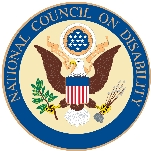An independent federal agency, the National Council on Disability (NCD) is made up of 15 members, appointed by the President, whose objective is to promote policies, programs, and practices that provide equal opportunities for individuals with disabilities and help empower the disabled to achieve economic self-sufficiency and a means of independent living, with an ability to also integrate themselves into society.
In 1978, upon the amending of Title V of the Rehabilitation Act of 1973, the National Council on Disability (NCD) was established as an advisory board within the Department of Education. The President was charged with selecting its 15 members, after soliciting recommendations from parties and organizations representing a broad range of individuals with disabilities, and organizations interested in people with disabilities, with all NCD members to either be people with disabilities, parents or guardians of disabled people, or others who have substantial knowledge or experience relating to disability policy or programs. The Rehabilitation Act Amendments of 1984 (pdf) transformed the NCD into an independent federal agency, and further changes were made in its statutory mandates by the Rehabilitation Act Amendments of 1992 and 1998, as well as the Education of the Deaf Act Technical Amendments of 1993.
The National Council on Disability (NCD) analyzes and makes recommendations on issues of public policy that affect people with disabilities, advocating programs and practices that provide equal opportunities for everyone who is disabled, and helping facilitate independent living, community integration, and employment opportunities for people with disabilities.
According to the NCD, its responsibilities include:
- Make proposals, such as its Towards Independence report (pdf) in 1986, which suggested that Congress enact a civil rights law for people with disabilities. This led to the enactment of the Americans with Disabilities Act in 1990.
- Advise the President, Congress, and other federal agencies on the development of disability programs and potentially more effective ways to achieve the desired opportunities and results for the disabled.
- Identify the evolving needs of people with disabilities by conducting hearings, forums, and conferences around the country, to listen to concerns and solicit suggestions.
- Work to see that educational and employment opportunities for those with disabilities are continually expanded.
- Educate the public on disability issues by publishing and distributing an NCD newsletter; providing copies of policy briefs and reports on the NCD web site; creating media outreach opportunities; and responding to telephone calls, emails, and letters.
- Review and evaluate, on a continuing basis, policies, programs, practices, and procedures concerning individuals with disabilities conducted or assisted by Federal departments and agencies, to help promote effective delivery of federal services to people with disabilities, particularly unserved and underserved populations, such as those in rural areas.
- Continue to address the Congressional mandate requiring NCD coordination with the Federal Emergency Management Agency (FEMA) on key homeland security subjects, including helping FEMA devise the most effective, viable guidelines and plans of action regarding the needs of individuals with disabilities in the event of emergency situations like a natural disaster or act of terror.
- Operate Advisory Committees which focus on disability issues affecting those from diverse cultural backgrounds, individuals with disabilities worldwide, and young disabled people.
- Increase access for the disabled to assistive and universally designed technologies, in areas like voting systems and airline self-service kiosk set-ups.
From the Web Site of the NCD:
The National Council on Disability (NCD) Fiscal Year 2012 Budget Justification reported the following projected agency expenditures:
Salaries and Benefits $1,865,971
Contracts $799,529
Rent $349,500
Travel $290,000
Communications $50,000
Equipment $25,000
Printing $20,000
Supplies $20,000
First Openly Autistic White House Appointee
When President Barack Obama nominated Ari Ne’eman to the National Council on Disability, he set off a firestorm of criticism from advocates.
Ne’eman, the first council member with autism, has been a lightning rod because of his views on the condition. He believes the government and society need to stop trying to “fix” autistic people or make them “normal.” He also says more money should be spent on improving support for autistic people, instead of finding a cure for the condition.
He has been outspoken about autism since he was in high school. He was only a teenager when he founded the Autistic Self Advocacy Network.
Stop Trying To ‘Fix’ Autistic People and Concentrate on Inclusion (by Mary O’Hara, The Guardian)
Exclusive: First Autistic Presidential Appointee Speaks Out (by Steve Silberman, Wired)
White House Appointee Ari Ne’eman on the Power of Autistic Community (by Steve Silberman, NeuroTribes)
- Table of Contents
- Overview
- History
- What it Does
- Where Does the Money Go
- Controversies
- Suggested Reforms
- Comments
- Leave a comment


Clyde Terry was named by President Obama on September 18, 2016, to be chairman of the National Council on Disability (NCD). Terry had been a council member since 2011.
Terry certainly has experience with disabilities; he has been blind since birth because of a rare childhood glaucoma. Nonetheless, he earned a B.S. degree from Emerson College in 1974 and went on to get a law degree in 1985 from Franklin Pierce Law Center (now the University of New Hampshire School of Law).
He never practiced law as such, but Terry was a hearing officer/Americans with Disabilities Act (ADA) coordinator at the New Hampshire Division of Mental Health and Developmental Disability’s Office of Client and Legal Services from 1988 to 1994. Terry then moved on to the New Hampshire Developmental Disabilities Council, first as director of policy and planning and, beginning in 2001, as its executive director. While there, Terry fought for accessible polling places, which resulted in him being the co-author of “Voters Denied Equal Access at the Polls; A Status Report of the Accessibility of Polling Places in the United States” in 2001.
Terry left the following year to become CEO of Granite State Independent Living, a non-profit that provides training and support services for the disabled. In 2011, while still in charge of Granite, he was named to a seat on the NCD, where he served on the Policy Development and Program Evaluation Committee. While there, he became the first blind person to “drive” an Audi automated car, taking a spin around the Washington, D.C., area. He has advocated for automated cars to accommodate disabled drivers. Another of his goals is to ensure fair wages for disabled workers, instead of a subminimum that some are allowed by federal law to receive.
Terry and his wife Susan Palmer Terry, a business consultant, have a son and a daughter.
-Steve Straehley
To Learn More:

Jonathan M. Young was appointed to the National Council on Disability as a board member and chairman by President Barack Obama in December 2009.
- Latest News
- D.C. Public Schools will Teach all Second-Graders to Ride a Bike
- New Rule in Germany Limits Sales of Sex-Themed E-Books to 10pm to 6am
- What Happened to the 6-Year-Old Tibetan Boy the Chinese Government Kidnapped 20 Years Ago?
- U.S. Ambassador to Turkey Photoshops his Hair Color to Mock Turkish Mayor
- Mystery Artist Calls Attention to Unfixed Potholes by Drawing Penises around Them
An independent federal agency, the National Council on Disability (NCD) is made up of 15 members, appointed by the President, whose objective is to promote policies, programs, and practices that provide equal opportunities for individuals with disabilities and help empower the disabled to achieve economic self-sufficiency and a means of independent living, with an ability to also integrate themselves into society.
In 1978, upon the amending of Title V of the Rehabilitation Act of 1973, the National Council on Disability (NCD) was established as an advisory board within the Department of Education. The President was charged with selecting its 15 members, after soliciting recommendations from parties and organizations representing a broad range of individuals with disabilities, and organizations interested in people with disabilities, with all NCD members to either be people with disabilities, parents or guardians of disabled people, or others who have substantial knowledge or experience relating to disability policy or programs. The Rehabilitation Act Amendments of 1984 (pdf) transformed the NCD into an independent federal agency, and further changes were made in its statutory mandates by the Rehabilitation Act Amendments of 1992 and 1998, as well as the Education of the Deaf Act Technical Amendments of 1993.
The National Council on Disability (NCD) analyzes and makes recommendations on issues of public policy that affect people with disabilities, advocating programs and practices that provide equal opportunities for everyone who is disabled, and helping facilitate independent living, community integration, and employment opportunities for people with disabilities.
According to the NCD, its responsibilities include:
- Make proposals, such as its Towards Independence report (pdf) in 1986, which suggested that Congress enact a civil rights law for people with disabilities. This led to the enactment of the Americans with Disabilities Act in 1990.
- Advise the President, Congress, and other federal agencies on the development of disability programs and potentially more effective ways to achieve the desired opportunities and results for the disabled.
- Identify the evolving needs of people with disabilities by conducting hearings, forums, and conferences around the country, to listen to concerns and solicit suggestions.
- Work to see that educational and employment opportunities for those with disabilities are continually expanded.
- Educate the public on disability issues by publishing and distributing an NCD newsletter; providing copies of policy briefs and reports on the NCD web site; creating media outreach opportunities; and responding to telephone calls, emails, and letters.
- Review and evaluate, on a continuing basis, policies, programs, practices, and procedures concerning individuals with disabilities conducted or assisted by Federal departments and agencies, to help promote effective delivery of federal services to people with disabilities, particularly unserved and underserved populations, such as those in rural areas.
- Continue to address the Congressional mandate requiring NCD coordination with the Federal Emergency Management Agency (FEMA) on key homeland security subjects, including helping FEMA devise the most effective, viable guidelines and plans of action regarding the needs of individuals with disabilities in the event of emergency situations like a natural disaster or act of terror.
- Operate Advisory Committees which focus on disability issues affecting those from diverse cultural backgrounds, individuals with disabilities worldwide, and young disabled people.
- Increase access for the disabled to assistive and universally designed technologies, in areas like voting systems and airline self-service kiosk set-ups.
From the Web Site of the NCD:
The National Council on Disability (NCD) Fiscal Year 2012 Budget Justification reported the following projected agency expenditures:
Salaries and Benefits $1,865,971
Contracts $799,529
Rent $349,500
Travel $290,000
Communications $50,000
Equipment $25,000
Printing $20,000
Supplies $20,000
First Openly Autistic White House Appointee
When President Barack Obama nominated Ari Ne’eman to the National Council on Disability, he set off a firestorm of criticism from advocates.
Ne’eman, the first council member with autism, has been a lightning rod because of his views on the condition. He believes the government and society need to stop trying to “fix” autistic people or make them “normal.” He also says more money should be spent on improving support for autistic people, instead of finding a cure for the condition.
He has been outspoken about autism since he was in high school. He was only a teenager when he founded the Autistic Self Advocacy Network.
Stop Trying To ‘Fix’ Autistic People and Concentrate on Inclusion (by Mary O’Hara, The Guardian)
Exclusive: First Autistic Presidential Appointee Speaks Out (by Steve Silberman, Wired)
White House Appointee Ari Ne’eman on the Power of Autistic Community (by Steve Silberman, NeuroTribes)
Comments


Clyde Terry was named by President Obama on September 18, 2016, to be chairman of the National Council on Disability (NCD). Terry had been a council member since 2011.
Terry certainly has experience with disabilities; he has been blind since birth because of a rare childhood glaucoma. Nonetheless, he earned a B.S. degree from Emerson College in 1974 and went on to get a law degree in 1985 from Franklin Pierce Law Center (now the University of New Hampshire School of Law).
He never practiced law as such, but Terry was a hearing officer/Americans with Disabilities Act (ADA) coordinator at the New Hampshire Division of Mental Health and Developmental Disability’s Office of Client and Legal Services from 1988 to 1994. Terry then moved on to the New Hampshire Developmental Disabilities Council, first as director of policy and planning and, beginning in 2001, as its executive director. While there, Terry fought for accessible polling places, which resulted in him being the co-author of “Voters Denied Equal Access at the Polls; A Status Report of the Accessibility of Polling Places in the United States” in 2001.
Terry left the following year to become CEO of Granite State Independent Living, a non-profit that provides training and support services for the disabled. In 2011, while still in charge of Granite, he was named to a seat on the NCD, where he served on the Policy Development and Program Evaluation Committee. While there, he became the first blind person to “drive” an Audi automated car, taking a spin around the Washington, D.C., area. He has advocated for automated cars to accommodate disabled drivers. Another of his goals is to ensure fair wages for disabled workers, instead of a subminimum that some are allowed by federal law to receive.
Terry and his wife Susan Palmer Terry, a business consultant, have a son and a daughter.
-Steve Straehley
To Learn More:

Jonathan M. Young was appointed to the National Council on Disability as a board member and chairman by President Barack Obama in December 2009.
- Latest News
- D.C. Public Schools will Teach all Second-Graders to Ride a Bike
- New Rule in Germany Limits Sales of Sex-Themed E-Books to 10pm to 6am
- What Happened to the 6-Year-Old Tibetan Boy the Chinese Government Kidnapped 20 Years Ago?
- U.S. Ambassador to Turkey Photoshops his Hair Color to Mock Turkish Mayor
- Mystery Artist Calls Attention to Unfixed Potholes by Drawing Penises around Them





Comments